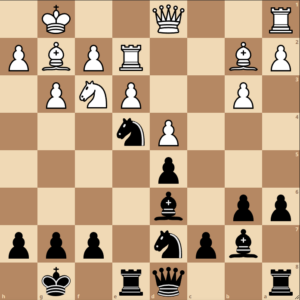Most chess player’s game analysis, if they do it at all, looks somewhat like this:
- Switch on the engine
- Play through the games, looking for mistakes
- See what they should have done instead
- Finish the game analysis, feeling they’ve learned something
If that comes close to what you do, you absolutely have to read this Newsletter. This process is flawed and won’t help you improve.
The Wrong Question
In the above process, the question you ask yourself is wrong.
You search for an answer to the question, “What would have been a better move?”
Answering what alone doesn’t really help you, unless you get the exact same position again and can remember the move you should have played instead.
The questions you should ask yourself during game analysis are:
- Why
- How
Why
If you want to get better at chess, you need to work on your understanding and move-finding processes. To do so, ask yourself Why:
- Why is another move better than mine?
- Why did I make this move?
Why For Chess Understanding
The first question is helping you understand chess better.
Seeing the engine show +1.5 on another move while yours is -0.5 doesn’t say much yet. You need to understand why this move is actually better than yours to be able to find it in the future.
Was it a tactical oversight? Did you allow a counterattack? Is trading off this piece a big positional mistake?
If you don’t understand why a certain move is better than yours, you have no chance of finding such a move in the future.
Let’s take an example from my own game, GM Wagner – GM Studer in 2019.

In this position, I played 13…f5, which the engine doesn’t like. White has an advantage after it, while black is to be slightly preferred after 13…Nxc3 or Ndf6. Why is my move wrong?
Because 13…f5 only weakens my position, the attack I envisioned – g7-g5, Qd8-f6-h4, f5-f4—is too slow and doesn’t work. This wasn’t the biggest mistake in this game, but it was the initial mistake that led to many more mistakes.
Why For Better Process
Once you understand why your move wasn’t ideal, you need to understand why you made that move during the game. Was it a miscalculation? Were you lazy to think at all and just played the first move that came to mind? Did you miss a candidate move from your opponent?
Without this step, you learn a little bit about chess, but your decision-making stays the same. Most likely, during a real game, you will repeat the same mistake.
In the example above, I was over-optimistic about my own attacking chances while underestimating my opponent’s chances on the queenside.
How
That’s when the How comes into play. Knowing your problem is one thing, having a clear plan of solving that problem is the second step to your solution. For example, if you miss a simple candidate move from your opponent and blunder a piece because of it, your how can be:
“Check for opponent’s ideas before checking for my own ideas.”
If you always make positional mistakes (chess why), find a book to read on positional chess to work on that weakness. In the example above, I realized a tendency to get too ambitious and not realistic when I’m on a winning streak (5/5). So the ‘how’ was:
Remind myself before every game to play the position.
Ask why to understand the nature of your mistake. Ask how to construct a plan to avoid that mistake in the future.
The Right Analysis Process
If you want to do it right, analyze your games like this:
- Note important moments from your games and why you decided on certain moves
- Switch on the engine
- Play through your games and focus on big mistakes
- Understand why a move given by the Engine is so much better than yours
- Check why you decided on a move that turned out a big mistake
- Ask yourself how you can avoid that mistake in the future
This is obviously a simplified version, but I hope it helps.
If you want further guidance on learning the maximum from your own games, I have three ways to help you improve that process:
- Read my extended articles (step 1, step 2) on OTB classical game analysis
- Read my article on analyzing quicker time control games
- Get my Next Level Training course, with more than 1 hour of videos on how to analyze your games.
This is the ideal moment to get this course because it is on a limited time 30% discount until Saturday, June 22nd. Go check it out, you have a 14-day money-back guarantee, so no risk involved if you decide to get it.
Keep asking the right questions,
Noël